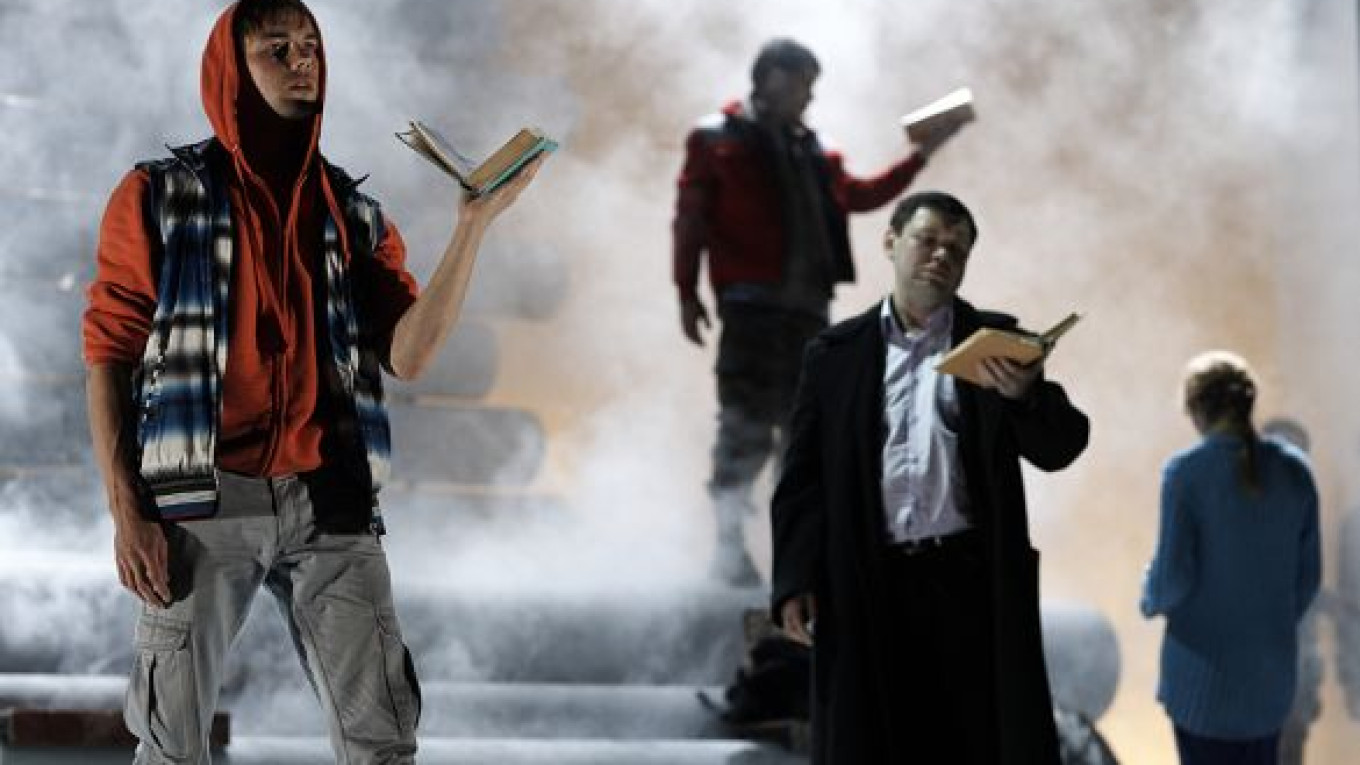Following the publication of his first novel "GenAtsid" in 2009, Vsevolod Benigsen found himself at the center of attention in the world of Russian letters. Although it was not unanimously praised by the critics, the novel about a state-sponsored cultural experiment taking place in a God-forsaken village was nominated for numerous awards and won the annual prize presented by the journal Znamya for best novel of the year.
Under the title of "GenAtsid. The Tale of a Village," it has now been adapted for the stage and produced at the Sovremennik Theater.
The man standing behind the production is Kirill Vytoptov, who, with some speed, has made a name for himself as a director to watch in the very near future. His recent productions of "Seryozha" at the Sovremennik and "The Razvalins" at the Playwright and Director Center have demonstrated a sharp directorial eye and a good feel for the unusual on stage.
His adaptation of "GenAtsid," created with designer Nana Abdrashitova, comes across as something of an attempt to go mainstream. Gone are the mysterious and intriguing narrative leaps of the previous small-scale shows in favor of a big, sweeping comedy.
There is plenty that is dark in "GenAtsid," whose punning title I'll get to in a moment, but that is not what takes the lead in Vytoptov's production. This is more of a fun and colorful romp with a few wry smiles thrown in to remind us that there is always another side to comedy.
One thing that keeps getting in the way of this particular rendition is what I might call theater-as-usual. Much of this production struck me as rote routine, the performances, Abdrashitova's set which appears to want to imitate a log cabin, the choices that the director and designer made when turning prose into drama.
The title, playing on the word "genocide," is an acronym for the program the Russian government puts into effect in the small village of Benigsen's imagination. It is a combination of the words "general unified national idea." Its purpose is to examine what will happen to a select population if it is forced to read the classics of Russian literature.
The project is put into action by the town's head policeman (Sergei Shekhovtsev) and the local librarian (Ilya Drevnov), not exactly a match made in heaven. From time to time the disembodied voice of a highly-placed government official booms out orders that echo ominously in the air.
Predictably the townspeople are taken aback by, or are even hostile to, the program when they learn about it. As one drunk puts it when he hears the bad news, "Major, just tell it to us straight. Are things going to get worse or better?" It's a line that receives one of the biggest laughs of the night from the audience. And yet, faced with punishment if they do not agree to memorize and publicly recite some part of a great work of Russian literature, the townspeople begin to undergo changes.
One brief and comic confrontation occurs when people discuss the difference between prose and poetry. Their conclusions are thrown into confusion when one man complains in despair that he doesn't know where he stands — he was given a series of prose poems to recite.
These attempts at cultural wit aside, however, this production is primarily a portrait gallery of country folk.
We observe the young mail carrier Katya (Klavdia Korshunova) as she struggles to get a grasp on her complex relationship with the wayward Mitya (Yevgeny Pavlov). We watch the quietly cynical doctor (Georgy Bogadist) as he invariably maintains a safe distance from everybody in town, sometimes by donning an enigmatic Leo Tolstoy mask. We observe the postal mistress (Svetlana Korkoshko) as something in her is awakened by Alexander Blok's poem, "The Unknown Woman."
It is here that the production falters most. In an age when authenticity — or, at least, attempts to achieve something close to it — have invaded all genres in the arts, the spectacle of big city actors playing at imitating country bumpkins is just not convincing. If the goal was to crank the impersonations up to the level of caricature or grotesque, that fell short, too.
One senses in "GenAtsid" an attempt to create a big commentary on current sociological and political trends. What was achieved, instead, was a fairly commonplace satire of down-home country life.
"GenAtsid. The Tale of a Village" (GenAtsid. Derevensky Anekdot) plays Dec. 31, Jan. 3 and 18 at 7 p.m. at the Sovremennik Theater, located at 19 Chistoprudny Bulvar. Metro Chistiye Prudy. Tel. 495-621-6473. www.sovremennik.ru. Running time: 2 hours, 35 minutes.
Related articles:
A Message from The Moscow Times:
Dear readers,
We are facing unprecedented challenges. Russia's Prosecutor General's Office has designated The Moscow Times as an "undesirable" organization, criminalizing our work and putting our staff at risk of prosecution. This follows our earlier unjust labeling as a "foreign agent."
These actions are direct attempts to silence independent journalism in Russia. The authorities claim our work "discredits the decisions of the Russian leadership." We see things differently: we strive to provide accurate, unbiased reporting on Russia.
We, the journalists of The Moscow Times, refuse to be silenced. But to continue our work, we need your help.
Your support, no matter how small, makes a world of difference. If you can, please support us monthly starting from just $2. It's quick to set up, and every contribution makes a significant impact.
By supporting The Moscow Times, you're defending open, independent journalism in the face of repression. Thank you for standing with us.
Remind me later.


